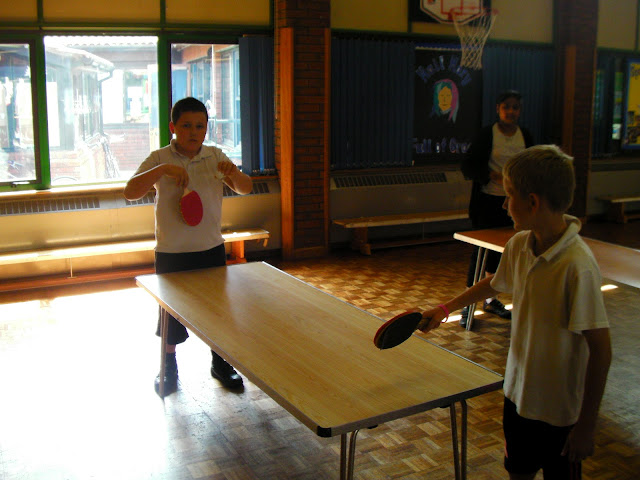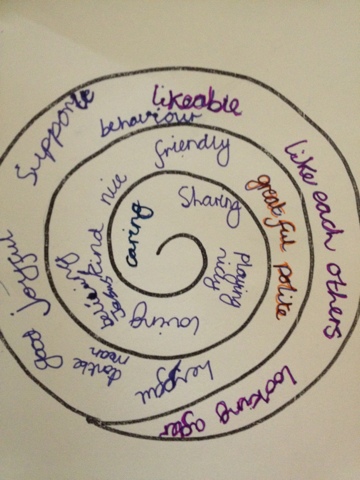St Joe's Blog

Wednesday, 30 May 2012
Tuesday, 29 May 2012
Looking at the location of Olympic medal winners
Y5/6C have been investigating the distribution of Olympic medal winners. We used atlases and globes to find countries that have won 50 or more medals in the Summer Olympic games and thought of reasons why some countries win more medals than others.
Our findings sparked a lot of discussion. We found that generally the location of most medals were won by the richer/Western countries or mostly the Northern Hemisphere. Some exceptions were the number of medals won by Kenya and Jamaica, who are strong at specialist events.
'You find most medals winners are in the richer countries, because they have more facilities and or more money to send athletes/competitors to other countries. The rest of the countries are poor and don't have the facilities or resources.' By Ollie
Our findings sparked a lot of discussion. We found that generally the location of most medals were won by the richer/Western countries or mostly the Northern Hemisphere. Some exceptions were the number of medals won by Kenya and Jamaica, who are strong at specialist events.
'You find most medals winners are in the richer countries, because they have more facilities and or more money to send athletes/competitors to other countries. The rest of the countries are poor and don't have the facilities or resources.' By Ollie
Olympic Torch Relay
Y5/6C have been following the Olympic torch relay around the UK. In maths we looked at the distances between routes and the estimated time the torch will arrive in each destination. We used this information to calculate the average speed the torch would need to go to ensure it arrived on time.
Table tennis
Y5/6C are beginning to try out different Olympic events as part of their Olympics topic. Today we played table tennis. As we were using small tables we kept the game simple, with the aim being how long we could keep a rally going.
Games evaluation
Y4J were busy evaluating their computer games today. They were learning about how important it is to hear other people's opinions when you are designing a game.
The games are great!
Monday, 28 May 2012
Great wrting from Luke in Year 5
Gerald was proudly marching down the road, holding the glorious Olympic Torch. People crowded in on him like a swarm of locusts. Look, look at him, he's holding the Olympic Torch. Flash, flash, people took pictures of him. Swish, swish, the flags were swaying from side to side.
Well done Luke.
Well done Luke.
Friday, 25 May 2012
Thursday, 24 May 2012
Tuesday, 22 May 2012
Skeleton games
Friday, 18 May 2012
Year 1 Pentecost Assembly
Year 1 performed their class assembly today. It was based on Pentecost. The children used loud voices and some of the used their home languages during the performance.
Wednesday, 16 May 2012
Pirate stories
Year one used their own story plans to write a pirate story for their Big Write. They were so good that Mr Condon asked some to read their stories out before lunch.
Tuesday, 15 May 2012
Dem bones
In Y4J the children have been looking the relationship between the sizes of bones in the body. After measuring themselves, they have been creating graphs to show the relationship. Today they have been writing reports to show what they have found out.
Monday, 14 May 2012
Tuesday, 8 May 2012
Friday, 4 May 2012
Y5P Let's communicate
Y5P Let's Communicate
Y5P are looking at the importance of language in communication. We wrote our own versions of the poem; ‘I Asked the Little Boy Who Cannot See’ to try and empathise with those who are missing one of their senses. We used similes to help description.
I asked the little boy who cannot see,
“And what is colour like?”
“Why red”, said he,
Is the pain of a sharp cut.
Blue is the sound of rippling waves on a calm sea.
White is the soft fur on a kitten
And orange is the excitement of going to the fun fair on a summer’s day.
Gold is the taste of honey dancing on your taste buds.
Black is like me - the boy who cannot see.
By Joe L.
I asked the little boy who cannot see
“And what is colour like?”
“Why yellow,” said he,
“Is the warmth of the beaming hot sun.
And pink is as soft as cotton candy at the circus.
Red is the smell of smoke from a burning fire.
Blue must be the taste of the salty seas
And black is as cold as ice on a winter’s day.
White is the blossom from a tree falling on to me face.
By Meigan W.
I asked the little boy who cannot see,
“And what is colour like?”
“Why red,” he said, Is like the sound of a saxophone.
Silver is as striking as the sound of lightning.
Gold is warm like the sun.
Black is like the darkest guilt
And pink is the greatest feeling ever, - Love.
By Mikenagh
Y5P are looking at the importance of language in communication. We wrote our own versions of the poem; ‘I Asked the Little Boy Who Cannot See’ to try and empathise with those who are missing one of their senses. We used similes to help description.
I asked the little boy who cannot see,
“And what is colour like?”
“Why red”, said he,
Is the pain of a sharp cut.
Blue is the sound of rippling waves on a calm sea.
White is the soft fur on a kitten
And orange is the excitement of going to the fun fair on a summer’s day.
Gold is the taste of honey dancing on your taste buds.
Black is like me - the boy who cannot see.
By Joe L.
I asked the little boy who cannot see
“And what is colour like?”
“Why yellow,” said he,
“Is the warmth of the beaming hot sun.
And pink is as soft as cotton candy at the circus.
Red is the smell of smoke from a burning fire.
Blue must be the taste of the salty seas
And black is as cold as ice on a winter’s day.
White is the blossom from a tree falling on to me face.
By Meigan W.
I asked the little boy who cannot see,
“And what is colour like?”
“Why red,” he said, Is like the sound of a saxophone.
Silver is as striking as the sound of lightning.
Gold is warm like the sun.
Black is like the darkest guilt
And pink is the greatest feeling ever, - Love.
By Mikenagh
Wednesday, 2 May 2012
Subscribe to:
Comments (Atom)






































